As in every sport, so in armwrestling too there are strict rules and regulations. They are based on the WAF (World Armwrestling Federation) rules. Thus all the commands are issued in English, and each fighter needs to know and understand them.
In armwrestling the worst nightmare for any contestant is fouls. The offences leading to disqualification can be divided into two groups:
WARNINGS:
-first warning
-second warning, leading to foul
FOUL:
-first foul
-second foul, leading to automatic loss
Any contestant can commit all the offences during a bout, like first warning, second warning and foul, one foul and one warning, one foul and second warning leading to second foul and loss. Warnings and fouls can be issued by both the side and the main referee. The final decision, however, is always up to the main referee. They can always consult the side referees when in any doubt.
CORRECT BOUT SEQUENCE
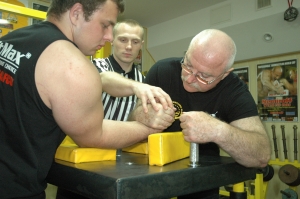
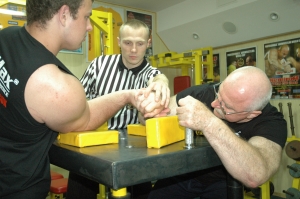
Every fight starts with the “Ready, Go!” command, and ends with “Stop!”. The fight is lost when any part of a contestant’s arm from their wrist to their fingertips touches the side pad. The referee points out the winner of the fight with an outstretched arm, saying “Winner!”. There is no time limit to a fight.
FOUL ELBOW
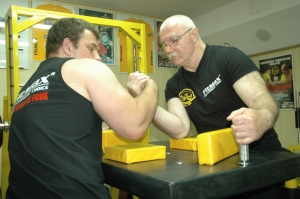
The first instance where a foul can happen in a fight is an elbow foul. This can happen in two cases.
Instance 1
The first case of an elbow foul is an elbow lift from the elbow pad. A lift is not called if the elbow is lifted, but the contestant’s forearm or triceps are still in contact with the pad, and the elbow is not outside the pad’s circumference. A foul is not called if elbows of both fighters are lifted simultaneously. The bout is then stopped and restarted again.
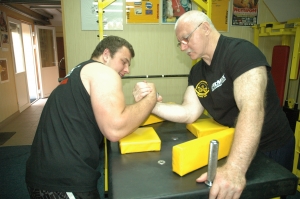
Instance 2
The second case is an elbow slip from the pad. This happens when the fighter’s triceps or forearm are still in contact with the pad, but their elbow slips outside the pad’s circumference.
FORBIDDEN CONTACT FOUL

Forbidden contact happens when one contestant applies pressure with their shoulder, chin or head, leaning on their opponent’s hand.
INTENTIONAL SLIP OUT FOUL
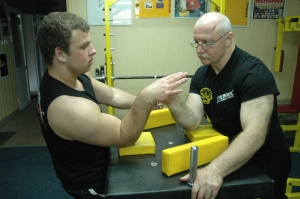
A foul will be called if one of the opponents commits an intentional slip out:
1.Opening one’s fingers or taking the fingers outside the opponent’s hand with intention to slip out
2.Slipping out of the grip when in winning position, when pinning opponent proves to be too difficult
3.Making a fist inside the opponent’s grip
4.Opening one’s fingers when one’s wrist is supinated towards opponent, or placing them under opponent’s hand in a way that makes any grip impossible
DANGEROUS POSITION FOUL
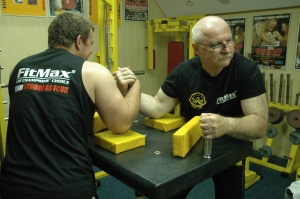
CASE # 1
Twisting one’s upper body outside the grip, putting one’s shoulder forward (taking the grip outside the arm circle), taking one’s eyes off the grip.
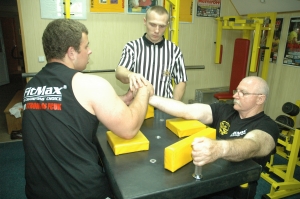
CASE 2 and 3
Second dangerous position happens when the fighting arm is overextended at the elbow. Third position is when one’s shoulders go lower than the edge of the table.
INTENTIONAL PUSHING OUT OF THE ELBOW

When one of the opponents intentionally pushes the other’s elbow off the pad, that is a foul. The person who’s elbow was pushed off the pad will not receive any penalty.
FOUL IN LOSING POSITION
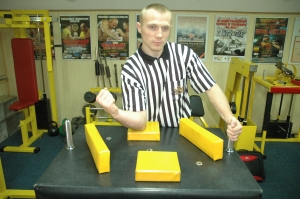
For breaking the rules when in losing position, the offender is automatically punished by losing the fight. The losing position starts 2/3 of the way between the vertical and side pad.
ADDITIONAL FOULS
-intentional scratching / fingernail poking the opponent’s palm
-moving while the referee’s grip is being set
-placing one’s shoulder or head on the wrong side of the table’s central line
-explicit vocabulary, unsportsmanlike behavior
-kicking the opponent’s leg off the table leg, when previously agreeing for them to do so
-using the table leg for leverage without previously being allowed to do so
WARNINGS
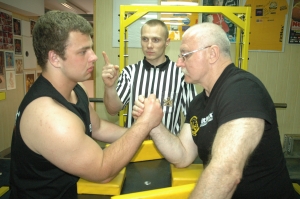
Besides fouls, warnings can be issued by the referee. Two warnings equal one foul.

A referee can issue a warning without breaking up the fight. A warning can be issue if a hand slips momentarily off the table’s grip. If an advantage is gained when this happened, a foul is given. Contact with the table’s grip needs to be maintained above the table’s surface. The only exception is made for the contestants with only one arm / hand.
MAIN OFFENCES WARRANTING A WARNING:
-false start – starting before “Ready, Go!”
-playing for time when assuming the starting position
-quarreling with the referee
-offensive language, unsporting behavior
-ignoring referee’s commands
-approaching dangerous position
Paweł Podlewski

